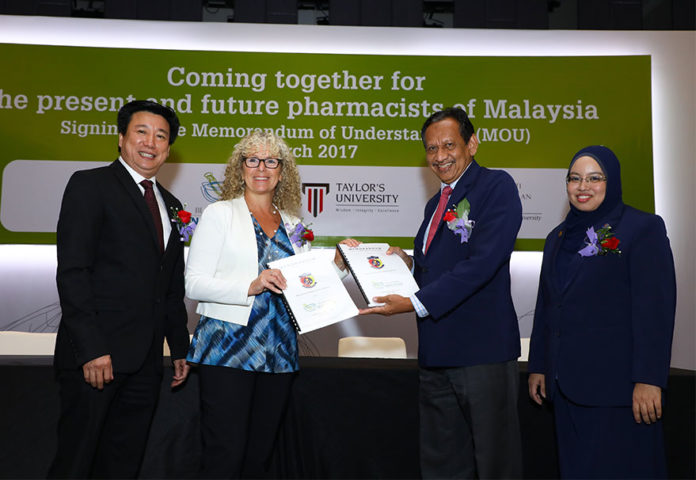
- MPS, Blackmores, UKM and Taylor’s sign MoU to spearhead safe use of complementary medicine
- Research show Malaysians are increasingly investing in complementary medicine such as health supplements
- Programe modules expected to be launched mid-2017
Kuala Lumpur, 17 March 2017 – The Malaysian Pharmaceutical Society (MPS) together with Blackmores Institute, Universiti Kebangsaan Malaysia (UKM) and Taylor’s University, have come together to support pharmacists lead the national conversation on the use of complementary medicine providing appropriate guidance to both consumers and patients.
Through the development of a unique, evidence-based healthcare education programme, the collaboration aims to equip Malaysian pharmacists – present and future – with the knowledge and understanding surrounding complementary medicine and its beneficial uses alongside conventional medicines.
The use of complementary medicine such as herbal medicines, nutritional supplements, and vitamin and mineral supplements is on the rise worldwide to help prevent, treat, or manage illness.
In Malaysia, research has shown that we are increasingly investing in over-the-counter complementary medicine such as health supplements which, beyond addressing deficiencies, are widely considered to reduce the burden of disease, and enhance quality of life.
“Increasingly, complementary medicine is being shown to work alongside conventional treatments to help individual manage complex health conditions and improve their quality of life,” Director of Blackmores Institute, Dr Lesley Braun said.
“Therefore, it is vital that our healthcare professionals can provide the public with clear, evidence-based advice regarding the best way to use these combined methods to improve safety and enhance responsible use of integrative medicine,” he pointed out.
The MoU signing recently between the four parties signifies the start of the learning journey which will instill pharmacists with the confidence to act as trusted consultants of integrative medicine for consumers across the country.
“Given their pharmacological expertise and distinct relationship with consumers, pharmacists are in a unique position to undertake this pivotal role,” MPS President Amrahi Bin Buang said.
“Even though many pharmacists have shown interest for additional complementary medicine learning, very few have been exposed to formal study on this subject,” he said.
Amrahi said therefore, the collaboration will provide pharmacists with quality resources and distinct learning opportunities that ultimately could help guide the Malaysian public to reach the best possible health outcomes.”
“The program will enhance pharmacists’ knowledge and their contribution to the society, which is in line with MPS’s 50th Anniversary theme: ‘My Society, My Passion’ – representing MPS, as well as the Malaysian community at large, which the pharmacists continue to serve passionately,” he said.
The program will be CPD accredited, allowing pharmacists to gain additional professional development points as they progress through.
With the formalisation of the partnerships, the modules are expected to be launched in mid-2017.
Leading educational institutions, UKM and Taylor’s University also provide the programme with distinctive but complementary insights and perspectives, which will help to unify the national understanding of complementary medicine and bring a holistic learning process for pharmaceutical students in both public and private universities.
“As part of the collaboration, students that are interested in complementary medicine will also be provided with the opportunity to further research in this field through the research grants and internships awarded by Blackmores Institute,” Professor Datuk Seri Dr. Noor Azlan Ghazali, vice-chancellor of Universiti Kebangsaan Malaysia said.
“The MoU signing marks the first step in educating pharmacists, both current and future, in the importance of integrative medicine, elevating their roles as trusted consultants to help guide the Malaysian public in their quest for better health.
Vice Chancellor and President of Taylor’s University, Professor Michael Driscoll, meanwhile said that educational institutions understand that pharmacy students need to have complementary medicine as an integral part of their training.
“We are delighted to be involved as part of this distinguished initiative to help promote complementary medicine learning in the pharmacy faculty of all institutions and ensure all students receive empirical insights regarding the use of complementary medicine.”